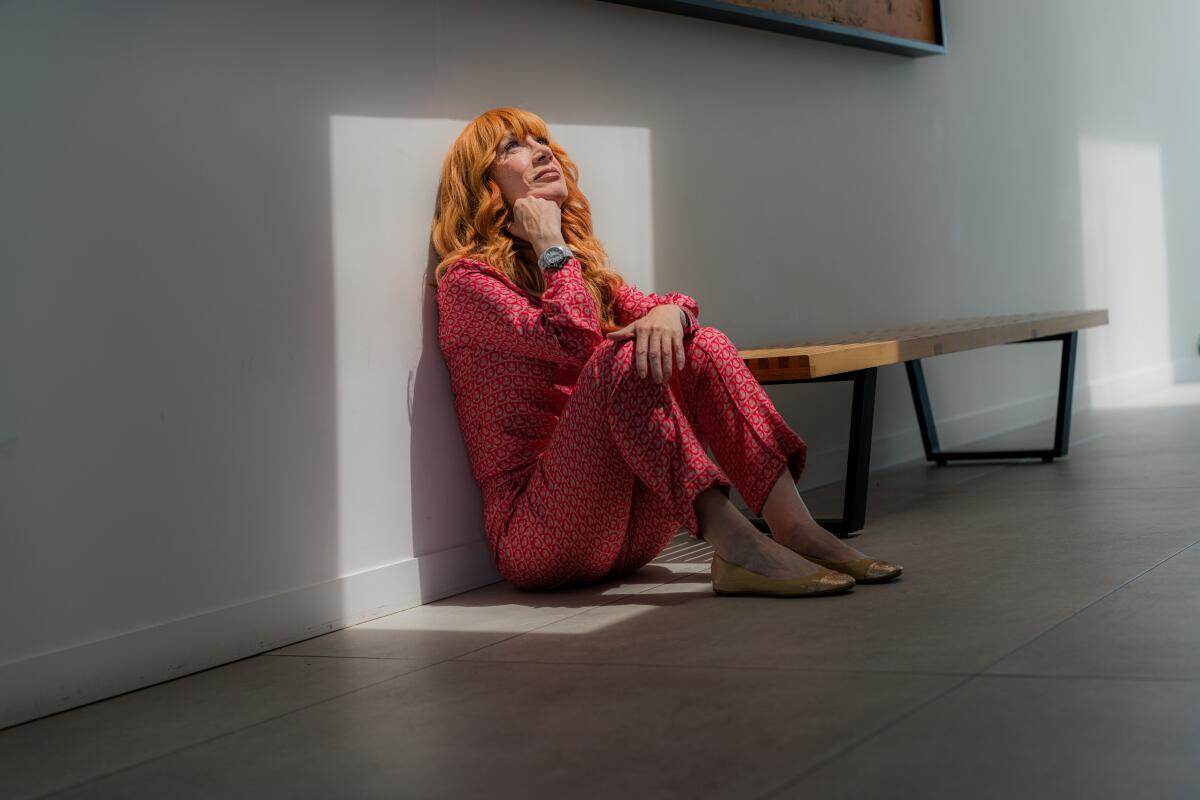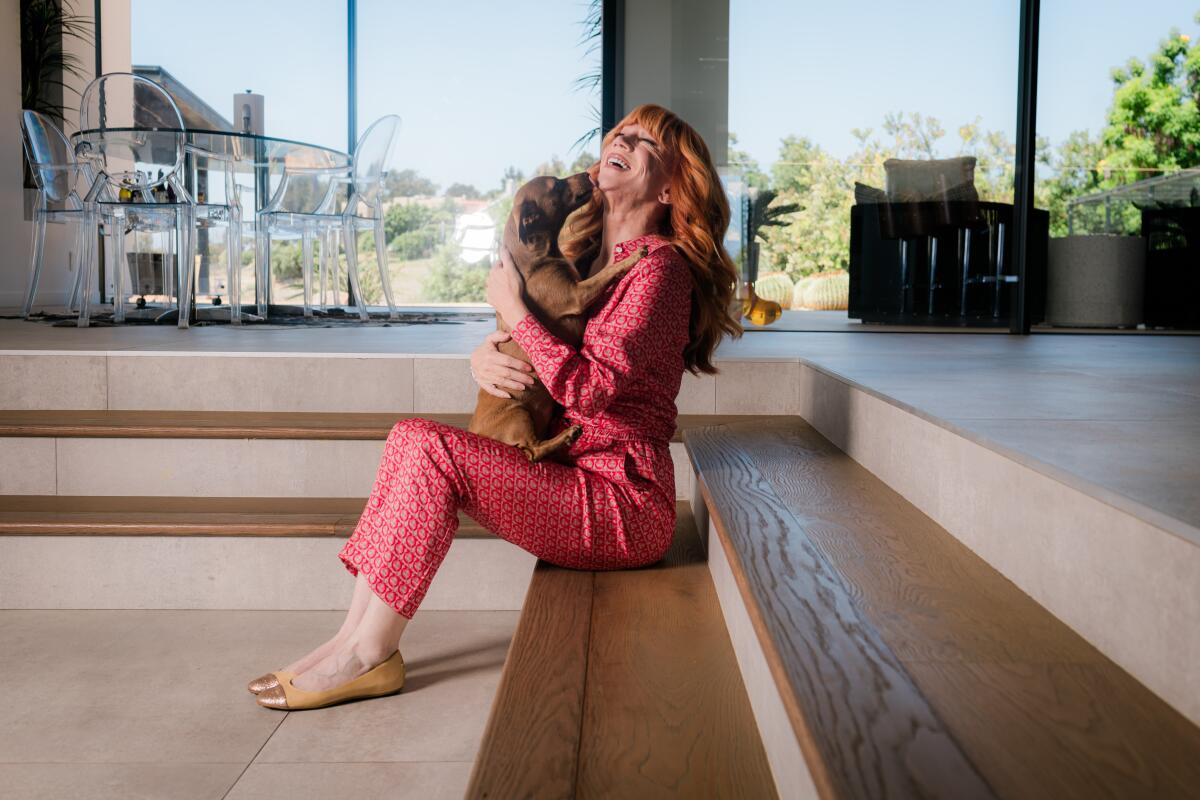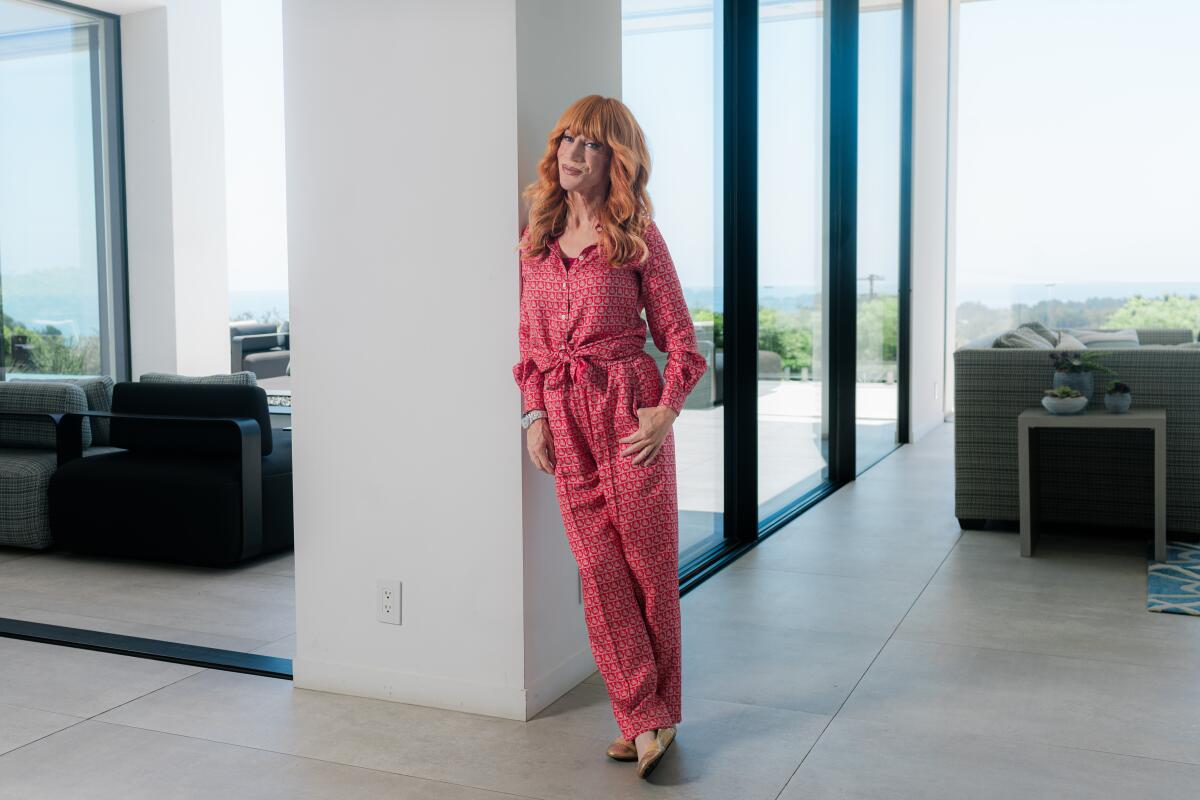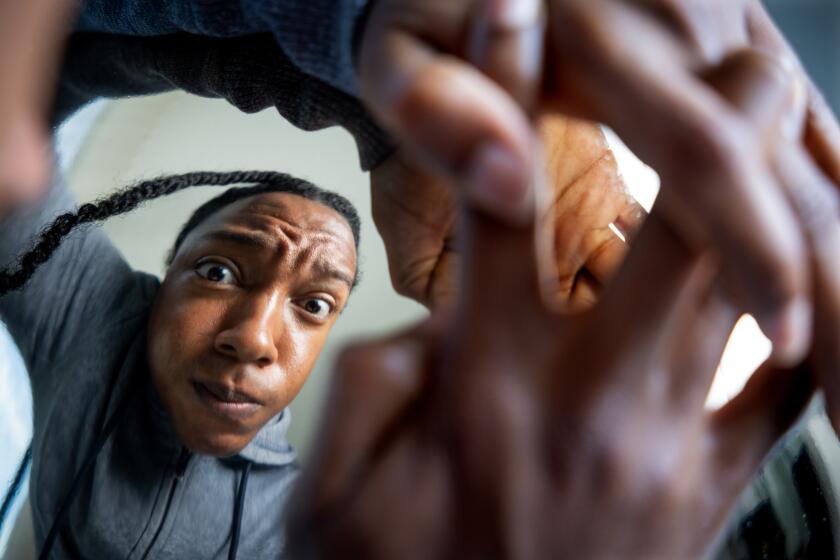Kathy Griffin’s voice in comedy won’t be silenced by Trump trauma, ageism or destroyed vocal cords

- Share via
Kathy Griffin has her voice back.
Recently, a new implant in her left vocal cord has fixed the squeaky whisper marring her speech for four years.
“It’s a freaking miracle,” Griffin says.
Her original voice is back in a broader sense, too.
“Honey, it’s been a rough few years,” the Grammy-winning comic, actor, producer, best-selling author and activist elaborates, “the Trump thing, the cancer, the divorce.”
The 2017 “Trump thing” (holding a severed Trump mask covered in ketchup) included being investigated by the government, placement on the national No Fly list and being unable to travel for performances. Griffin’s mother passed in March 2020, and a pill addiction led to Griffin’s suicide attempt that June.
After six years away from the stage, Griffin now returns with resilient, new material for her extended “My Life on the PTSD-List” tour, which reaches the Wiltern Theatre on Wednesday, Sept. 18. The tour name references her Emmy-winning TV series as well as ongoing challenges like staying sober, ignoring death threats, moving past lost CNN deals and committing to therapy for complex PTSD.
Griffin’s comedy remains story-oriented. Her shows are filled with repeat diehards and locally tailored, including personal roasts of audiences in each city. She hasn’t had an opener in 25 years, and Griffin still stays onstage for two-plus hours.
Some of her stories take a more serious tone these days. For example, “a story about how I very seriously tried to take my life, wrote a note, the whole thing, and ended up 5150 psych hold at Cedars.”
Yet for Griffin, the Guinness World Record holder for most comedy specials, celebrity sells. “And bookend that sh– with a funny story about going to Paris [Hilton’s] house,” she says. “A funny story about going to Mexico with Sia, where everything went wrong.”
At her home in Malibu, Calif., a week after popping up as a surprise guest on an already jaw-dropping “Barbies” lineup at local L.A. theater Dynasty Typewriter at the Hayworth alongside Rosie O’Donnell, Aparna Nancherla, and Anjelah Johnson-Reyes, a post-recovery Griffin recommends yelling at the TV while watching politics, knowing one’s value and learning how to fight long-term in the face of inequality.

What did the process of having your voice repaired entail, and how has the recovery process been?
I was getting shots every six months where I had to go under general [anesthesia] and they would shoot in a collagen-like substance, which would fatten my left vocal cord. My right one was moving, and my left one was dead. Once again, my mortal enemies — middle-aged white heterosexual men — those f— let me go around, show business with a voice [squeaks] like this!
I could cry thinking about it. It was so awful for almost four years. Finally the singer Sia, she’s one of my besties, she’s like, “Oh, no no no. There is a female surgeon whose name is Dr. Anca Barbu.” Sia’s singing coach is a woman named Amy Chapman. And Amy works for Barbu. I know I’m being a bitter b—, but I just find it very hard to believe that “Oh, well this old white guy cured this celebrity. And this one made it so Ozzy [Osbourne] can sing again. And this one brought this singer back to life. And blah, blah, blah.” I could have gotten this the day after my cancer surgery!
When they took out half of my left lung, they injured me so severely that they killed my left vocal cord for life. I currently still have an aperture, which means a tear above my cords. You can still see the scar. I just had the surgery five weeks ago and then I had to be on two weeks vocal rest, which was living hell. But it has been such a game changer. It’s a mood lifter. Now I like to yell at the TV screen. Last night during that very emotional Harris/Walz rally, I got to yell at the screen like other good solid Democrats.
My house isn’t on the beach, but it’s a water view. And I find that very comforting. When I was coming back from the lung-cancer surgery or this one where I had to be quiet, just looking at the water was big time. Never in my born days did I think that this little lady from Forest Park, Ill. would be able to live in Malibu, look at the ocean and run in fear from Mel Gibson.
Your material on this “My Life on the PTSD-List” tour hadn’t been political. Did that change after the Trump assassination attempt and Vice President Kamala Harris entered the presidential race?
I don’t mention Trump in the new show. It’s not that I am afraid to, honestly. I did a whole tour about that incident, and I made a documentary called “Kathy Griffin: A Hell of a Story.” You can see it free on Amazon because no one, I mean no one, would distribute it because I’m a toxic terrorist who’s on the No Fly list.
But I really, really hope to get a special with this material. I think it’s ageism and sexism. These dudes getting specials, they don’t know what it’s like to play Carnegie. I don’t mean to sound like a braggart, but I think I should have a special. It’s kind of appalling that there are still so many male heterosexual executives that are my age or older that are secret Trumpers, and they own everything. What people don’t know, and what I’m not afraid to say even though it gets me in trouble, is that five old white guys, most of whom are Trumpers, control every bit of media we consume.
I don’t think people understand that nothing’s changed. It’s still the boys club, especially when it comes to stand-up. I’m just shocked, because that’s the conversation Joan Rivers and I used to have right up until she passed away. She said she had that conversation with Phyllis Diller, and I’m sure Phyllis had it with Totie Fields, and her with Moms Mabley. It’s still like that.

Yet the benefit of your own theater tour means your demographics and audiences can still come directly to you. You have the opportunity to be much more intimate and revealing with them and to go anywhere, talk about anything with them. There’s no machinery or anyone else in the way.
At 63, if I had to go back and play clubs, I would retire. Yeah, it’s heaven. And I purposely do a long show because I’m so used to doing specials. I’ve done 21 specials, which certainly no guy has, living or dead of any level, not even close. And I have a Grammy for best comedy special. I’m one of only four women to this day in the entire history of the Grammys. I keep thinking they’re going to eventually have to get a little bit better. But once you’re 63, it’s a whole other level. The ageism almost takes the place of the sexism. So yes, women are for sure getting more opportunities, but how many women can you name over 60 that really are at this level? Four?
I have asked countless of my straight bro friends, “Okay, it’s a bro weekend. You and your bros want to go see a comedy show, but you don’t want to go to a club. You want to see somebody with a name. Would it ever occur to you, you and your bro friend, to go see me, Chelsea, Sarah Silverman, Wanda?” And every single one of them said, “To be honest, Kath, no. We want to see Chappelle, Rock, Mulaney.” It’s like, “Oh, it’s didn’t even occur to me to think of a girl.” I don’t know how to fight that. So I keep saying it, even though my agents and managers hate when I say that.
How have you gone about fostering those kind of connections and opportunities that work towards creating that kind of change?
When I was blacklisted, I was like, “Okay, how do you make new friends when you’re 57?” And then I thought about the salons I used to go. I was trained by two women on how to have them: Sue Mengers, the first female, really big power agent, and my dear friend Gloria Vanderbilt.
Mengers said you have to cast them. So I put the introvert next to the extrovert. I separate couples. I have somebody like Meredith Lynch, who’s just starting stand-up, but also is an expert on private equity. Some folks stuck by me like the beautiful Aubrey Plaza, who brought me a casserole two days after the Trump thing. Not everybody dumped me, but it was a lot. These salons became just a way for me to talk to people, and listen to people. Something magical happens when you put your phones away and you just share a meal. We joke around a lot, but we talk about substantial sh—.
There’s something about that environment. People get vulnerable. They talk about stuff that they wouldn’t talk about if it was a cocktail party with 30 people milling around. I used to do two a year, and now I’m trying to do one a month. The first one I had was for a guest of honor named Sidney Poitier. I had two for Dylan Mulvaney. I also had two for E. Jean Carroll, because everybody wants to meet Jean. I tend to try to pick a guest of honor that’s typically a woman who’s been through the fire in some way, shape or form.

The new tour and new material represents a point of culmination and healing for you, and a new beginning both professionally and in your personal life. Are there new goals that you’ve set for yourself once the tour is over?
When the tour’s over, I’m back on the breadline, honey. I don’t have one goddamn offer. I’m a grinder. It’s been like that my whole life. I’ve never been a turner-downer. I f— say yes to the opening of an envelope.
But the truth of the matter is, I’ve been doing this for so long, I get a lot of repeat business. I’m very lucky in that way, because my fans know I’m going to give them new s— every time. Just in these first 40 cities, I’ve done shows that are two hours and 30, 40 minutes.
I’m not shortchanging those tickets. Those tickets aren’t cheap. I’m fearful people would think that health-wise, I’m not up to it anymore. And that’s not the case, especially since the implant. So I am still there.
I do my shows for the people that buy the tickets. And so far, literally every show, I’ve gotten a standing ovation, by the way. I know a lot of it is because of the cancer, but I don’t care. I’ll take it!
More to Read
The biggest entertainment stories
Get our big stories about Hollywood, film, television, music, arts, culture and more right in your inbox as soon as they publish.
You may occasionally receive promotional content from the Los Angeles Times.











